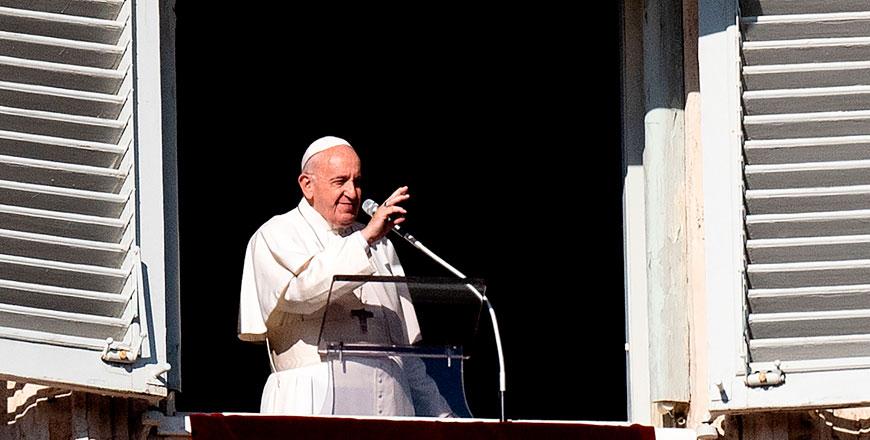You are here
UN, Pope voice solidarity with Burkina Faso after militant attack
By AFP - Dec 26,2019 - Last updated at Dec 26,2019

Pope Francis delivers his blessing to the faithful during the Angelus prayer, on Thursday, at St Peter's Square in the Vatican (AFP photo)
OUAGADOUGOU — A militant attack that left 42 dead in the north of Burkina Faso, the worst assault in the country for five years, plunged the country into mourning over Christmas and sparked messages of solidarity from the United Nations and Pope Francis.
Thirty-five civilians, including 31 women, and seven soldiers were killed on Tuesday in a morning raid which lasted for several hours and targeted both civilians and a military base in the northern town of Arbinda, the army said, adding that 80 assailants were killed.
Around a dozen soldiers also died in a separate night-time ambush 60 kilometres away in Hallele, in the same volatile northern province of Soum, security sources said on Wednesday.
Burkina Faso, bordering Mali and Niger, has seen frequent attacks by extremist militants which have left hundreds of people dead since the start of 2015 when extremist violence began to spread across the Sahel region.
"A large group of terrorists simultaneously attacked the military base and the civilian population in Arbinda," the army chief of staff said.
"While the [military] group was under heavy fire, another group of armed individuals attacked the civilian population, mainly women including displaced people who had taken refuge in Arbinda," a security source told AFP.
President Roch Marc Christian Kabore confirmed that 35 civilians were killed in the "barbaric attack" in Arbinda and declared 48 hours of national mourning over Wednesday and Thursday.
Government spokesman Remis Dandjinou said 31 of the civilian victims were women.
Pope's prayers
There was worldwide condemnation of the attack, as well as expressions of support for Burkina Faso.
The UN Secretary General Antonio Guterres condemned the Christmas Eve attack and offered his "deep condolences" to the families of the victims, his spokesman Stephane Dujarric said in a statement.
"The secretary general conveys the solidarity of the United Nations to the government and people of Burkina Faso," he added, emphasising the UN's continued support for the Sahel region in their efforts to fight terrorism and violent extremism.
In his traditional Christmas message, Pope Francis denounced attacks on Christians in Africa and prayed for victims of conflict, natural disasters and disease on the world's poorest continent.
The pontiff urged "comfort to those who are persecuted for their religious faith, especially missionaries and members of the faithful who have been kidnapped, and to the victims of attacks by extremist groups, particularly in Burkina Faso, Mali, Niger and Nigeria".
In Brussels, the head of the European Council Charles Michel tweeted: "Inates in Niger yesterday, Arbinda in Burkina Faso today... Martyr towns, victims of a rampant terrorism that threatens us all. The European Union stands by Africa in its battle against terrorism."
Niger's President Mahamadou Issoufou also expressed his "solidarity" and, speaking "in the name of the Nigerien people" offered his "condolences for all civilian and military victims".
The morning raid in Burkina was carried out by more than 200 militants on motorbikes, triggering a fierce firefight that lasted about three hours before armed forces backed by the air force drove the militants back, a security source said.
No group immediately claimed responsibility for the bloodshed, but violence in Burkina Faso has been blamed on militants linked to both Al Qaeda and Daesh groups.
560,000 internally displaced
Leaders of the G5 Sahel countries held summit talks in Niger earlier this month, calling for closer cooperation and international support in the battle against the threat of extremist militants.
France is also hosting another meeting next month.
Militant violence has spread across the vast Sahel region, especially in Burkina Faso and Niger, having started when armed extremists revolted in northern Mali in 2012.
There are 4,500 French troops deployed in the region as well as a 13,000-strong UN peacekeeping force in Mali to fight insurgents, backing up national forces of the G5 — Chad, Burkina Faso, Mali, Mauritania and Niger.
In Burkina Faso, more than 700 people have been killed and around 560,000 internally displaced, according to the United Nations.
Attacks have targeted mostly the north and east of the country, though the capital Ouagadougou has been hit three times.
Prior to Tuesday's attack, Burkina security forces said they had killed around 100 militants in several operations since November.
An ambush on a convoy transporting employees of a Canadian mining company in November killed 37 people.
Attacks have intensified this year as the under-equipped, poorly trained Burkina Faso army struggles to contain the extremist militancy.
Related Articles
OUAGADOUGOU — At least 43 people have been killed in attacks in northern Burkina Faso, the government said on Monday, in what local sources
OUAGADOUGOU — Ten people were killed when an aid convoy was ambushed in Burkina Faso, the government said on Sunday, bringing to at least 50
PAU, France — French President Emmanuel Macron is hosting on Monday counterparts from five Sahel countries to reassess their joint fight aga

















